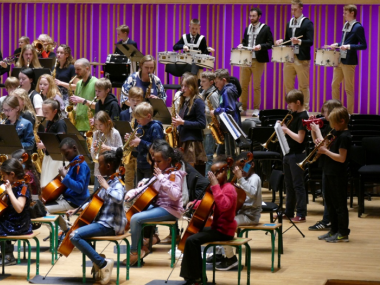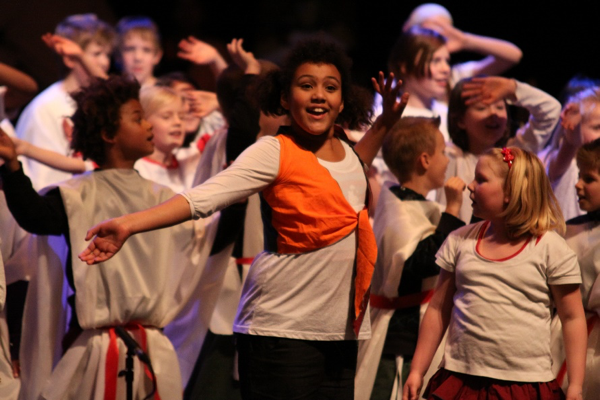Aarhus: music as driver for strong learning communities
Edited on
17 June 2020Aarhus School of Music is strengthening well-being among children and young people by introducing music concepts for social change. A paradigm shift has begun inspired by methods from L’Hospitalet in Spain.

Traditionally, music schools have been teaching how to play an instrument and read notes. But what if music can offer much more than learning an instrument? What if music can create communities and increase well-being among kids in daycare and schools?
Aarhus School of Music, Denmark, is part of the URBACT network, OnStage. In the network, Aarhus has seen, listened to and learned from the music school best practice city, L'Hospitalet de Llobregat, Spain. Experiences in the network have inspired Aarhus to rethink how music can positively influence society. In L'Hospitalet, results show that music, as an integral part of everyday life, can highly improve the well-being of children and lift an exposed local area.
From top-class to popular appeal
Aarhus School of Music has worked over several years with initiatives that would help strengthen the social efforts in the municipality. However, participation in the OnStage network has been a turning point. The network has inspired Aarhus to initiate a paradigm shift, that is going to change self-perception. It means that changes will be implemented all the way from how music will be taught in the future, to what kind of offers the music school provides to the city.
Aarhus School of Music will foster social inclusion and have a broad appeal, rather than a focus top-class performance. For this reason the music school is changing its slogan from: "Do you get enough music?" to "Together round the Music". The new slogan will be featured on all future material from the school and on Aarhus’ bus stands during spring.
"As a public music school, we want to support the City of Aarhus to become ‘a good city for everyone’. It is our job to create communities around and with music, that will enable children to grow as human beings in the communities which they are part of. We must be able to offer much more than just teaching an instrument", says Lars-Ole Vestergaard who is the head of Aarhus School of Music.
New offers on the way
Specifically, Aarhus School of Music will offer day care institutions and primary schools in the city some additional concepts besides the ordinary music lessons. A group of teachers will introduce the approaches on site and help them get started. They have four concepts in the offing, which are adapted to suit different ages:
1. The youngest - from nursery to kindergarten will get a chance to enjoy the 'singing treasure chest' based on the material on www.sangskattekisten.dk
2. The school starters will be given the concept 'Learning to be' based on stories and material from www.flaskeposttilfremtiden.dk
3. Pre-preparatory / intermediate pupils from 1st to 3rd grade will get orchestra playing as part of the compulsory music education
4. The intermediate pupils in 3rd to 6th grade will receive material from the World Music Center - an intercultural course with material at www.flaskeposttilfremtiden.dk
A group of music teachers have developed the concepts and they are now applying the finishing touches. A team of teachers will be responsible for the concepts for introducing them to children and their teachers.
"We expect our four concepts to strengthen the learning communities and the well-being of the children. Hopefully, in the annual satisfaction surveys, we will be able to see the improvements in writing", says Lars-Ole Vestergaard.
Over time, music should become an integral part of the culture. The concepts are meant to interconnect with everyday life and influence everything – from lessons starting with a song to music as part of events and parent-teacher meetings. When music becomes a part of everyday life it has a phenomenal ability to give a sense of community and the feeling of belonging. Children who does not thrive in day-care or schools are often missing this feeling.
"Music should increasingly bring children together in communities. Together with the teachers and PPR (Pedagogical, Psychological Counseling) we wish to raise the well-being and sense of belonging among children with our concepts", says Gunnild Bak de Ridder, development consultant at Aarhus School of Music.
They succeeded in L'Hospitalet
In 2008, a visionary Spanish music director began to introduce a new paradigm for music lessons among children in the city of L'Hospitalet, located outside Barcelona.
The initiative turned into a new approach to music, as music appeared as a successful catalyst for social change in the schools. With music as a focal point, school communities were created and provided children with good social and personal skills. Music was integrated in everyday life at the schools and thereby new types of learning communities were created – a community with room to listen, help and learn from each other. Music schooling became an instrument for human growth in L’Hospitalet. Suddenly music training had a higher purpose than learning to master an instrument.
At L'Hospitalet, the development started at one school and over several years the teaching methodologies were distributed to all 12 of the city's primary schools. It has solved some of L'Hospitalet's massive integration challenges and it has created a new culture in schools that is inclusive and community based.
Now L'Hospitalet's teachers pass on the methods in the URBACT network OnStage, in which seven European cities participate.
No change without challenges
Aarhus School of Music will work over the coming year to change cultures and perceptions. It is crucial to the success of the new initiatives, that all music schoolteachers understand and take ownership of the new methods. Therefore, some of the teachers, who will be teaching the new concepts, will study the network's partner cities through several learning sessions.
They must look, learn and be inspired by the other cities.
"There are many European cities with tremendous knowledge and good methods that we can learn from. We wish to use this knowledge while we are a part of the URBACT network. To be given this opportunity means the world to us and we are looking forward to implementing the new initiatives – in favour of both the children and their parents", says Lars-Ole Vestergaard.
The greatest gift is to take the decision
Aarhus School of Music has just begun the process of change. It will permeate the organization over the next years as change take time. An URBACT network runs over two-and-a-half years, and it is not enough for the network to follow the individual partner cities' journey and implement the initiatives. On the other hand, the period is adequate in terms of transferring and providing knowledge and inspiration. What the cities get is the courage to make decisions that will change the practice of the music schools.
For Aarhus School of Music it has been a gift to get the last push and very specific methods that have given them the appetite to make the municipal music school a place that gives more back to the city.

Written by the Danish URBACT National Point, Louise Meier Uldall
Read more about the On Stage network, https://urbact.eu/onstage
Read more about Aarhus School of Music (in Danish), https://www.aarhusmusikskole.dk/
Submitted by c.salido on
